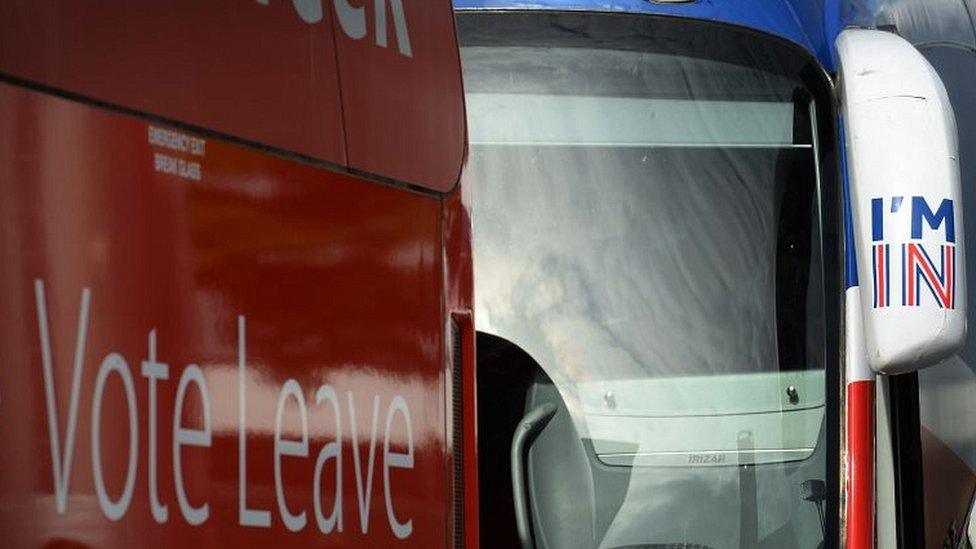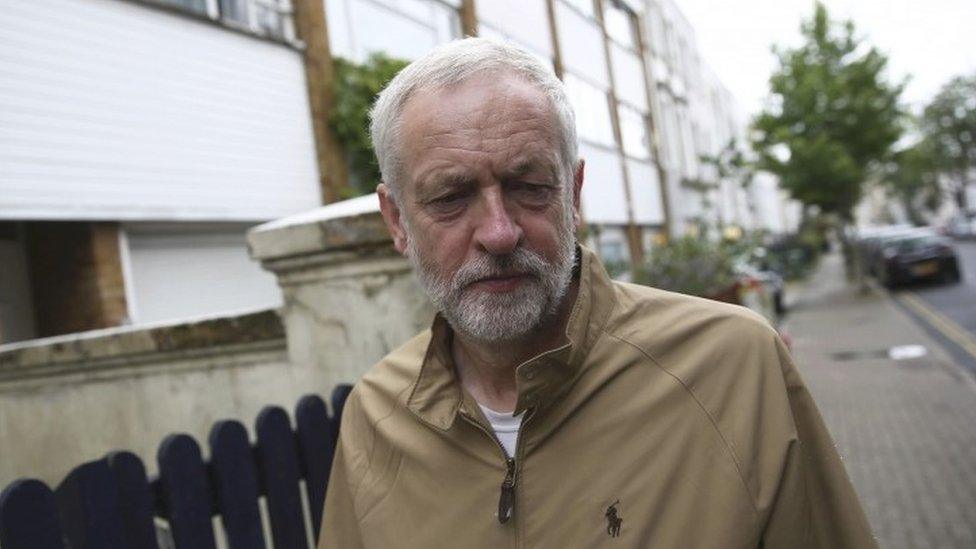How EU referendum has changed politics, whatever the result
- Published

Planes, trains, and automobiles, even helicopters and hovercrafts. Our politicians have taken to almost every form of transport in the last few weeks. We're on the road today tracking the two campaigns for the final day in what's been a noisy, bruising, often bitter, sometimes sober national conversation.
With the polls so tight, often in the margin of error, anyone who tells you with certainty that they know what will happen tomorrow is either brave or drunk. But there are already some emerging lessons about how the campaign itself might have changed politics, or in another sense, what it's done to it, that's before we even start dealing with the "what ifs" of Friday morning.
1. The referendum came about because of a decision that David Cameron took to hold off internal pressure in his own party and UKIP nibbling away at the Tory base. His team insist they had no choice, that it wasn't sustainable to carry on without offering a referendum. It was though, a political choice, not a response to overwhelming demand from the general public. The PM who wanted his party to stop banging on about Europe, has reopened old wounds in his party, and a whole new generation of MPs, many of whom frankly didn't care very much about the EU, have been forcibly sucked in to a festering dispute that has raged for decades. New wounds have been inflicted.
2. Whatever the result, the government is going to find it much harder to get anything done. The divisions in the Tory party are so great, that whether it's Leave or Remain, dozens of its MPs are going to wake up on Friday morning fundamentally cross. With a majority of only 12, any remotely contentious legislation is going to be hard to pass. One former minister already says the Outers are talking about the future as a 'coalition'.
3. There are obvious consequences to all of this for the Tory leadership. MPs and ministers are split almost down the middle on whether or not David Cameron will have to resign immediately if the vote is for Brexit. The alchemy and atmosphere on Friday morning and how the prime minister handles the immediate aftermath will matter. I expect senior Outers to come out and say that he should stay on, but another senior MP has told me they will call for a leadership challenge with the aim of cleaning the air, with the intention of making it possible for him to stay. Others though mutter darkly about an immediate leadership contest with the open intent of shoving him out. It's impossible to predict the timeline, but what nearly everyone in Westminster agrees on is that David Cameron's leadership has been curtailed by the last few months.
4. George Osborne's very widely-known and discussed prospects of taking over from his friend are not completely over, nothing ever is. But his chances of winning a contest are, right now, somewhere between zero and slim. There is a deliberate "Stop George" operation in play in SW1 - there has been for some time, but the way the Remain side have run their campaign has given them plenty of ammunition.
5. Boris Johnson has not had an easy time of it - already a political celebrity, now an even better known public figure. He has had unfortunate moments, some misjudged, and he has not made any more friends among the party ranks. But watching him on the stump, he has a pulling power with the public that other politicians would die for. Gaffes of the campaign are probably outweighed by that.
6. The Labour Party has struggled to get their core voters on side - and many MPs are worried that their foundations are disappearing from beneath them. Different factions in the party are already blaming each other for the campaign being lacklustre. As a campaign machine the party has been sluggish and shallow. In the immediate days after the referendum the headlines will be dominated by the Tories. But the campaign's exposed real problems within Labour too. Some even fear the referendum has accelerated the process where UKIP does to Labour in their traditional areas of support what the SNP did in Scotland.
7. It's reasonable now to expect an early election. The referendum has thrown everything up in the air for the main political parties and it's likely that the questions it has thrown up might have to be settled long before 2020.
8. If it's a Leave vote, it is very likely to be close. The tightness of the race has taken much of the political class totally by surprise. The campaigns that have been dominated by mud slinging and political insults have not inspired the public. To be honest I've heard plenty of voters still asking and wondering out loud why we are even having the vote in the first place. Some people are angry about that, a campaign that's created division and voters who actually trust anything that any politician has said are thin on the ground. Like in the Scottish referendum, campaigns that are not just about policies or personalities but about identity can unleash feelings that can't be put back in the bottle.
- Published19 June 2016
